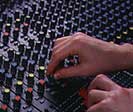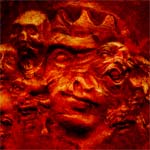| Author
|
Mixing in Keys --> Need help from people who do it
|
dtd
IsraTrance Junior Member

Started Topics :
17
Posts :
490
Posted : Aug 24, 2006 21:48
|
ahhh  thanks! i guess i was too focused on vinyl only. thanks! i guess i was too focused on vinyl only. |

|
|
Boobytrip
IsraTrance Junior Member

Started Topics :
39
Posts :
988
Posted : Aug 25, 2006 11:50
|
Quote:
|
On 2006-08-24 11:47, dtd wrote:
boobytrip: what when you pitch up/down the new vinyl/cd track to match the playing track in tempo (bpm), the new track won't be in the pitch you wrote down anymore, also, the two tracks are very unlikely to have the same fundamental pitch. what's the use of this procedure anyway, i'm not really sure?
greetings & thanks for explanation 
|
|
I write down the track bmp-speed and the pitch on cd-slips in my cd-wallet because it can be a real timesaver when playing out. When you're playing a track at a particular speed, and want to stay at approximately the same speed you can choose between several tracks you want to play. Most of the time you will know by intuition and experience exactly which track you want to play next, but sometimes you don't (at least, i don't always know  ). Knowing if the tracks will mix together in a musical way before you actually mix them can be really helpful at these moments. ). Knowing if the tracks will mix together in a musical way before you actually mix them can be really helpful at these moments.
When the tracks differ a lot in speed, and one of them is pitched, the mix will somtimes sound sour, but this would have also been the case if you had not known which key the tracks were in. Also, most of the time you will have mixed most tracks at home, and made a mental notition of cool transitions and bad ones.
So for me, it's just a bit more useful information to go on when mixing, and it's certainly not the most important information . Furthemore, it can be fun to mix together tracks just on the basis of their keys and bpms at home, and find really good combinations that you wouldn't normally have tried.
|

|
|
Forza
Forza

Started Topics :
68
Posts :
397
Posted : Aug 30, 2006 02:19
|
Hi everybody! 
I guess that many musicians here should know this already but i'd like to comment on it anyway.
90% of trance music and around 80% of electronic dance music is based on the minor key and it's variants if you pay attention to the intervals, even though the programs might tell you that a track is in a mayor key the intervals would be those of the minor key.
Also even though supposedly the "right" mixes are those who are in the same key or fifths or fourths away, the truth is that the fewer the difference in notes from one key to other the better so you might want to try going from C to D (just 2 notes of difference) and it might sound ok.
Now let's remember there are a lot of keys besides minor and major, and a lot of music, specially music derived from goa uses them, some examples are.
minor pentatonic
hebrew scale
blues scale
when a music is made on these keys the rules might change so is better to test the mix and check what the results are.
Also, like a lot of people said before, sometimes it's cool to have some disonance in the mix that's why knowing the fundamental key of your tracks is basic to do some experimenting, because that way you know where are you moving and what do you want to do with the music. fortunately now we have tools that make this task easier for us, but we still need to confirm by experimenting and mixing (it's heaps of fun too  ) )
        Peace, Love, Light and Harmony Peace, Love, Light and Harmony |

|
|
Surrender
IsraTrance Team

Started Topics :
506
Posts :
5388
Posted : Aug 30, 2006 14:13
|
wavelab's "global analysis" also gives you the pitch for left and for right channels seperately.
        "On the other hand, you have different fingers." "On the other hand, you have different fingers."
http://myspace.com/gadimon |

|
|
Ray Zed

Started Topics :
7
Posts :
150
Posted : Aug 30, 2006 17:10
|
|
if u play an instrument (i.e guitar or piano) this is for me the quickest and easiest way to work out keys. |

|
|
Psynaesthesian
IsraTrance Junior Member

Started Topics :
30
Posts :
557
Posted : Aug 30, 2006 18:36
|

Man how am i eva gonna catch up with this??
My life from today onwards .........
      
        "... b'om ..." "... b'om ..." |

|
|
Sunrunner
IsraTrance Junior Member

Started Topics :
17
Posts :
47
Posted : Aug 31, 2006 08:33
|
what i wonder about is key and mode - this seems to confuse the issue for me. i'm not a classically trained musician (but i've gone a music degree in sound, music and production) so my music theory isn't very in depth. but two tracks can not only be in different keys but in different modes, which (to my ear) can confuse the 'theory' of it.
i guess i just don't understand it properly 
i find it easiest just to mix by ear and see what works... not the best way to mix on the fly, but that's why it can help to practice djing with new tracks! |

|
|
Boobytrip
IsraTrance Junior Member

Started Topics :
39
Posts :
988
Posted : Aug 31, 2006 11:14
|
For me it's confusing because all kinds of terms are used for approximately the same thing.
A KEY defines the main chord (on the beginning and/or ending) of a musical section. Such a chord is usally made up of the 1st, the 3rd and the 5th notes of a SCALE, which are notes in a row, with a fixed number of INTERVALS between them. The interval between all notes in western scales is two semi-tones (like A -semitone-> A# -semitone-> B), except for B->C and E->F
MODES refer to scales created from a row of notes with the same intervals, but with different startingpoints in the row, like:
c-d-e-f-g-a-b-c (1) Ionian
d-e-f-g-a-b-c-d (2) Dorian
e-f-g-a-b-c-d-e (3) Phrygian
f-g-a-b-c-d-e-f (4) Lydian
g-a-b-c-d-e-f-g (5) Mixolydian
a-b-c-d-e-f-g-a (6) Aeolian
b-c-d-e-f-g-a-b (7) Locrian
If you make chords from these modes by playing together the 1st, the 3rd and the 5th notes of these rows of notes (scales) and use them as the main chord in your track, you will get 7 KEYS.
blablablabla... (by the way: am i the only one who avoids his work by checking/posting on Isratrance ?)
|

|
|
full_on
IsraTrance Team

Started Topics :
279
Posts :
5475
Posted : Sep 22, 2006 04:16
|
OK, the idea now is to get as many input from the artists as possible, getting the track keys right from the artists or from musicians who know what they're doing and comparing the right track keys with the results from each program, so we can figure out which programs are the best.
So if you know the track keys from some classic albums or music, like:
Hallucinogen - Twisted
FREq - Strange Attractors
Jaia - Fiction
and so on...
Just send me a PM or post the track keys here. I'm going to contact some artists in search for their tracks' keys, when I got 100 track keys I'll post the results here.
Thank you.
Respect!
        . .
...Be gentle with the earth...
...Dance like nobody's watching...
.
...I don't mind not going to Heaven, as long as they've got Coffee in Hell... |

|
|
Freeflow
IsraTrance Full Member

Started Topics :
60
Posts :
3709
Posted : Sep 23, 2006 01:50
|
full_on - just check your self, if you have a keyboard or piano... i think thats the best way...
some tracks are sharps, so dont forget the black keys 
though consider that the baseline is moving from
A to A# to C, 16th in 148bpm its kind of hard to tell the tone, especailly if its very low.... and maybe there is no "correct" tonal lead... just sound FX or detuned things... i dunno  darkpsy might be harder to analyze than melodic.. darkpsy might be harder to analyze than melodic..
|

|
|
Fu Hsi
Perfect Stranger

Started Topics :
5
Posts :
235
Posted : Sep 23, 2006 08:56
|
For more than a year now I mix only by scales and it improved my mixes alot ( in my opinion ofcourse ) I think that this is the ONLY way to mix properly. I wouldnt count on Mixmeister too much, maybe for simple full on or prog trance it works, but for more complicated pieces musically like Shiloh or Luke Chable from the electro scene it doesnt do the job. In any case I use the piano to find those scales and it is either very easy and also good to train the ears.
Blues scale and Minor Pentatonic are pretty much the same if I am not mistaken, and as far as I know there is no "Hebrew Scale"
The most important in my opinion in the mix is to know what will be your DOMINANT track during the mix itself and then to know to which scale u can jump to... Considering that mixing two of the same scale is pretty obvious ( only try not to mix minor tracks after major ones... it's traumatic to the dancefloor in many cases )
        http://perfectlystrange.com http://perfectlystrange.com |

|
|
full_on
IsraTrance Team

Started Topics :
279
Posts :
5475
Posted : Oct 1, 2006 23:24
|
Thank you for your feedback, but I need to be 100% sure of the track keys, so I need feedback from the artists or someone who is sure about the keys.
Please if someone knows the keys for any of these tracks send me:
Cosma - Non top
Any Infected CD
Any Rinkadink CD
Any Penta CD
Any FREq CD
Jaia - Fiction
or any other classic CD... I can even buy the album if I don't have it.
Thanks to Filteria and Burn in Noise who sent me the keys of all tracks in their albums.
I need 100 track keys to get nice statistics.
Please help if you can.
Respect!
        . .
...Be gentle with the earth...
...Dance like nobody's watching...
.
...I don't mind not going to Heaven, as long as they've got Coffee in Hell... |

|
|
Boobytrip
IsraTrance Junior Member

Started Topics :
39
Posts :
988
Posted : Oct 2, 2006 10:19
|
With all due respect sir: you can be sure for about 100% if you just listen and play along with a keyboard. And even if it's impossible to hear the the pitch, it will be impossible as well when you're mixing so it won't ruin your set anyways. Of course it's none of my business, but imho if you ask all artists for pitches you spend a lot of time for very little benefit.
good luck,
Daan
|

|
|
Basilisk
IsraTrance Full Member

Started Topics :
168
Posts :
2984
Posted : Oct 2, 2006 19:52
|
To quote an old tune from Full On 2, "I am no musician." I never learned how to play the piano, and don't know too much about music theory. I have, however, always wished to improve my DJing abilities. This interest led to an exploration of harmonic mixing, which I can share few words on.
I approached the subject from an analytical/technical perspective, seeking to find a tool that would help me determine the keys of songs in my collection. I might have tried jabbing keys on a piano, but the thought of going through such a laborious process for thousands of songs necessitated the discovery of an automated process of some kind. After some research, I came across Mixmeister Pro, which I have used to build a database of every track I own. One of the first concerns I had revolved around accuracy. An exploration of the Mixmeister forums yielded many discussions on the subject. The results of my findings: the program is about 60% accurate in finding the key. There is a catch, however: when Mixmeister goes wrong, it usually goes wrong in a very systematic way. Tracks erroneously listed as being of a particular key tend to get lumped together, so these errors do not necessarily hinder finding a harmonic mix.
There are other issues, of course. If a BPM changes somewhere in the song, Mixmeister won't get it right. If the key changes, forget about it. You have to know when those really epic tracks are going to modulate (change key mid-song). As mentioned, other scales will muss things up as well. Essentially, Mixmeister and other harmonic key finding programs are no substitute for the basics of DJing: know your music, use your ear, and heaps of practise... such programs can augment one's capabilities, however.
I first began to explore harmonic mixing after trying to work Ticon's Reflection into a mix. I found it absolutely impossible - nothing I was mixing in was going well. I knew there had to be a smart way to puzzle out such a challenge. This led me to Mixmeister, which I soon used to analyze the keys of every CD I own. It lists the Ticon track in keycode 11, which is fairly sparsely populated. It might be complimented by tracks from keycodes 10 and 12, but they are also fairly low on quality tunes at around 135 BPM. No wonder I was having trouble finding something to mix! The first time I selected a track to mix in based on what I found with Mixmeister, it worked like a charm. I was energized - here I had been spending an hour throwing down 20 different tunes in the effort to find something that would mix, and 5 seconds referencing my collection in Mixmeister finds me a match.
An aside: based on what I have discovered with Mixmeister, the distribution of music into the various keys is by no means even. There is clumping and, most importantly, bottlenecking. There are areas of the harmonic wheel which are hard to pass through, due to the lack of material. If you work with the program, you may find that keycode 12 is the worst pain in the ass, followed closely by keycode 3 and keycode 7. The results are no-doubt skewed by the inherent inaccuracy of the program (and the exact specifications of my own collection), but the reality of the situation remains the same: there will be key and speed ranges for which the options are limited. It is helpful to get an idea of where these are and explore what the best "bridging" tunes are... another aside: due to the filtering factors of key and tempo, harmonic mixing necessitates a massive music collection, assuming, of course, that one wishes to follow it fairly closely. This requirement for a large body of harmonic data is part of the reason why an automated process comes in handy. I simply can't imagine finding the keys for so much music by hand, even with the trade-off in greater accuracy.
When is harmonic mixing useful? I'll be blunt: this technique can be grossly overused. Again, my knowledge of music theory is not great, so excuse me if I am using the wrong terms here. I describe some psytrance as being very "tonal." I use the term "tonal" precisely because I have found that some progressive songs can be low on melody, but they will still sound wrong when mixed out of key, precisely because the bass line or some atmospheric hook carries a strong tone. Naturally, there is also a lot of psytrance that doesn't feel as if it has much of a tonal character at all. Take darkpsy for instance - with all the crazy noises and rollicking bass lines, I have not found harmonic mixing to be particularly relevant. The same goes for a lot of techtrance. On the other hand, melodic morning-time progressive from acts like Andromeda, Zen Mechanics, FREq, Ticon, etc. sounds very nice with a bit of harmonic forethought applied, and the same goes for a lot of peak-time full-on. Harmonic mixing sounds best with long flowing mixes where the melodies can really blend and compliment each other. When you find a matching pair, and the various components of each song glide against one another like the finest silk, then you're in DJ heaven 
The best use of the technique, in my opinion, is to adapt it to whatever you are playing, use a program to help with suggestions, but always rely on your ear for the final assessment. If you are equipped with a knowledge of music, a keyboard, and lots of time, it is probably best to figure it out on your own. If you are like me, a DJ with a massive collection of music and not so much knowledge of theory, automating the process and checking the results after the fact will probably do. I refer to the database to find a mix that could work when I'm planning a set, and then try it out and let my ear catch any errors in the findings.
Hopefully these words are of service to the discussion. I'd be glad if anyone with greater knowledge than I could point out where I have made any false assumptions. I have explored this subject without much in the way of assistance or guidance, and without any expertise in music theory, I really have no way to gauge how well-grounded my ideas may be. It could be that for some DJs, harmonic mixing is "more trouble than it's worth," but I am glad I have spent so much time trying to figure it out - I feel as if my mixing is far better than it was before.
For reference, here are a few links to mixes I have put out where I tried out harmonic mixing:
http://www.ektoplazm.com/audio/octopus-marmalade/
http://www.ektoplazm.com/audio/heliocentric/
http://www.ektoplazm.com/audio/mystic-revelation/ |

|
|
Madpup
IsraTrance Junior Member

Started Topics :
21
Posts :
174
Posted : Oct 17, 2006 15:03
|
The method I use to get the key of the track is very simple:
I use Tracktor and Virtual Piano, but any cheap keyboard program will do (or in fact any keyboard)
Put the CD in and load Tracktor, then select the desired track, change to pitch to 140 bpm and play it. It could be any bpm as long as you consistently record the key in at the same bpm for different tracks.
Then I simply play the key on the keyboard program picking by ear which is the key which sounds right with the track. I have no musical background, but it is still quite easy, didnt take me long to master that all.
All in all to get the key for all the tracks in one cd (average 9 tracks lets say) takes me about 5 minutes.
|

|
|
|